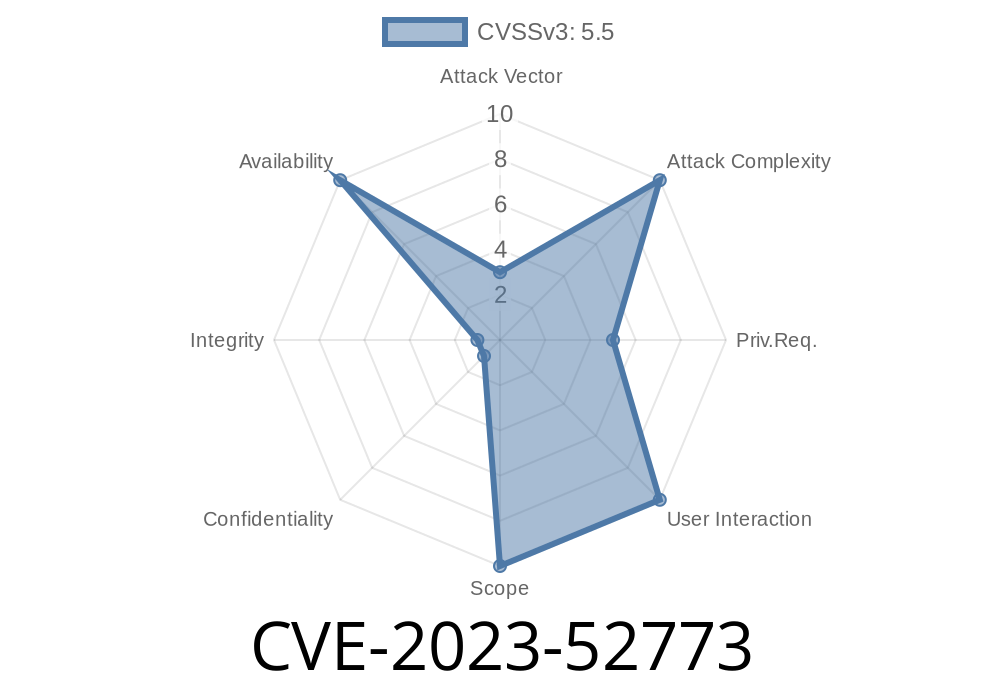In late 2023, a significant security issue was discovered and resolved in the Linux kernel’s AMD GPU driver. This vulnerability, designated as CVE-2023-52773, could lead to a system crash due to a NULL pointer dereference in AMD’s Direct Rendering Manager (DRM) code. In this post, we’ll break down what happened, who it could affect, show you the problematic code, and give you everything you need to know — all in clear, simple language.
What’s the Problem?
At the core of the issue was a function named amdgpu_dm_i2c_xfer. This code helps the system talk to display hardware, like monitors, using a protocol called I2C. Before making this connection, the system checks if the right hardware pin and link are available and working.
But a problem arose: if the hardware pin wasn’t set, or the link wasn’t there (which can happen when the user reloads or unloads the AMDGPU driver — such as during GPU testing), the function would still try to use them. This could lead to the Linux kernel trying to access memory that doesn't exist… and boom: Kernel panic, system crash, or, with creative exploitation, even deeper problems.
The Code in Question
Let’s look at the essence of the broken code. The problem starts when the system calls ddc_service_construct(), which is meant to set up communication with a display device:
// Example from the Linux kernel drm/amd/display/amdgpu_dm.c
if (!pin->hw_supported)
return -EINVAL;
struct ddc_service *ddc = ddc_service_construct(...);
if (!ddc) {
// This is where the wrong assumption happens
// It assumes ddc won't be NULL, but it can be!
}
ret = ddc_i2c_transfer(ddc, msgs, num);
The issue is if ddc_service_construct() fails (and returns NULL), the code doesn’t always check, and will attempt to use ddc anyway.
The Patch — How Was It Fixed?
The kernel maintainers updated the code to properly check if both the hardware pin and the link are set. If they’re not, the amdgpu_dm_i2c_xfer call now fails safely, instead of letting a NULL pointer cause harm. The fix is essentially:
struct ddc_service *ddc;
if (!pin || !link || !pin->hw_supported) {
return -EINVAL; // Cleanly fail now
}
ddc = ddc_service_construct(...);
if (!ddc) {
return -EINVAL; // Still cleanly fail!
}
// Safe to continue now
ret = ddc_i2c_transfer(ddc, msgs, num);
Who’s at Risk?
- Any Linux system with AMD graphics using affected kernel code, especially when drivers are loaded/unloaded repeatedly (common in testing tools like IGT).
- Systems where unprivileged users can trigger amdgpu_dm_i2c_xfer — for example, through display management or testing scripts.
Can You Exploit This Bug?
The primary risk is crashing the system — so this is a denial-of-service vulnerability. Exploiting for code execution is unlikely (but not impossible in very targeted attacks), because the pointer dereference just triggers a crash.
A simple theoretical trigger might look like
// Pseudocode to trigger the bug
unload_amdgpu_driver();
load_amdgpu_driver();
// Now, try to access a display (I2C communication)
// while the link info is still unset
// This would trigger the NULL dereference in vulnerable versions!
How To Stay Safe
- Upgrade your kernel: This bug was fixed in the mainline kernel after Dec 2023. Most stable kernel releases and distributions will have backported the patch.
Avoid reloading the amdgpu driver as root unless you know your kernel has been updated.
- Check your vendor: Most major distributions (Fedora, Ubuntu, Arch, etc.) have released patched kernels already.
Original References
- CVE-2023-52773 at NVD
- Linux Kernel Patch (commit)
- IGT GPU Tools
Conclusion
CVE-2023-52773 was one of those bugs that remind us: even in the world’s most-reviewed open-source code, the details matter. A simple missing check could take down a system at the wrong moment. Thanks to quick action by the Linux kernel and AMD driver teams, most users are now safe — but always make sure you’re running an up-to-date kernel, especially if you rely on advanced GPU features.
*Written exclusively for you — clear, simple, and practical.*
Timeline
Published on: 05/21/2024 16:15:16 UTC
Last modified on: 06/24/2024 15:34:25 UTC
